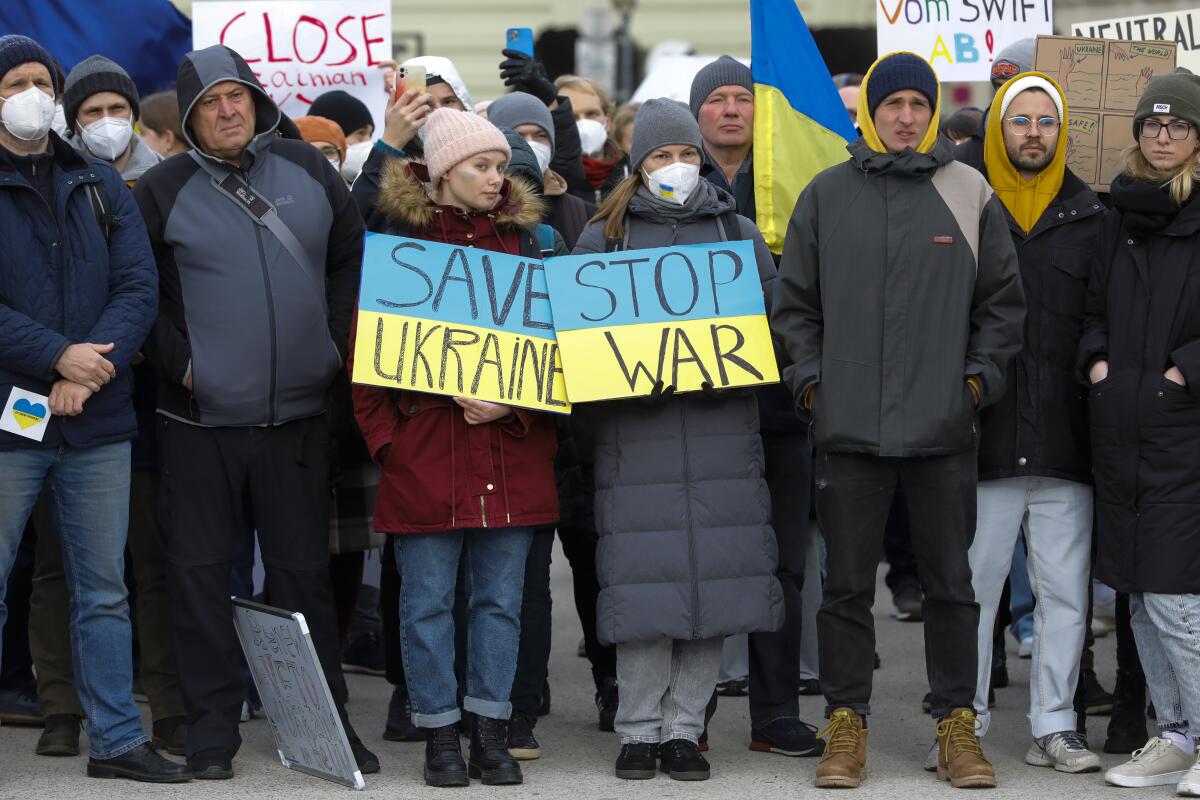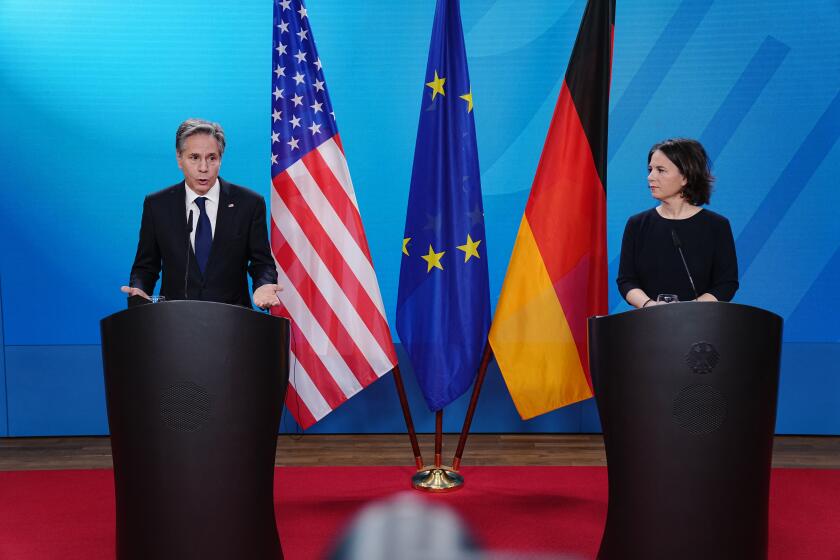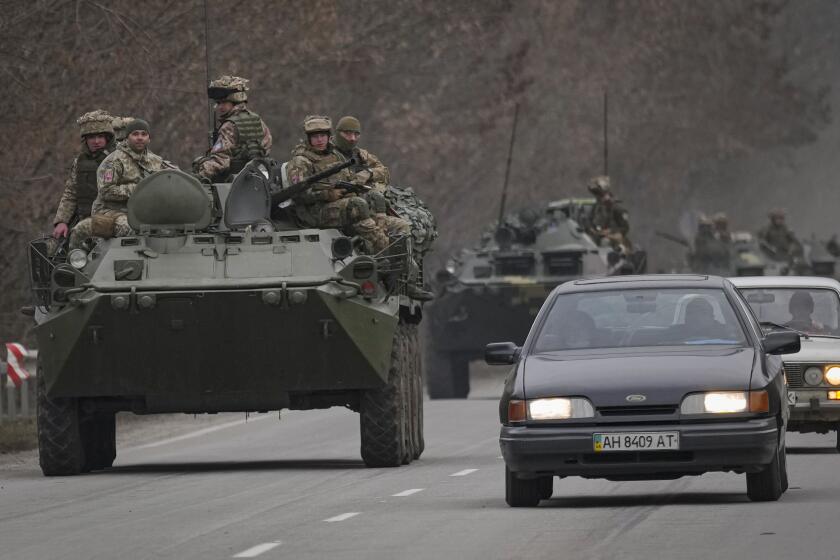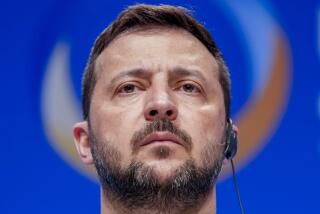Analysis: The ideals of a whole generation in Europe have been shattered

- Share via
BERLIN — When Annalena Baerbock, Germany’s foreign minister, appeared in the morning hours Thursday to make a statement, she looked pale and shocked. Dressed in a black robe, she voiced what probably most Germans were feeling at that moment: “We woke up in a different world today.” A world of war. A war in Europe only a 10-hour drive from where she had read her statement in Berlin.
Baerbock, 41, belongs to a generation that grew up not only in a Europe without war, but in a Europe without borders. When journeying through much of the Continent, from one country to the next, travelers don’t need to show their passports. Borders have lost their meaning.
That world, it seems, is gone, and the optimism behind it in tatters.
Instead, the North Atlantic Treaty Organization is talking about securing its borders, reinforcing its military presence in the east and protecting its alliance territory. The United States said Thursday that it was sending 7,000 additional troops to Germany, on top of the extra deployment of 2,000 troops to Europe that President Biden ordered earlier this month.
The biggest worry is this: How to prevent the war in Ukraine from spilling over, from becoming a war between Russia and NATO?
Vladimir Putin’s language, when the Russian leader announced a “special military operation” in Ukraine early Thursday, made the alliance fear the worst: “Whoever tries to hinder us, or threaten our country or our people, should know that Russia’s response will be immediate and will lead you to consequences that you have never faced in your history. We are ready for any turn of events.”
It’s clear now that Europe was not.
“I’m so angry at ourselves for our historical failure,” former German Defense Minister Annegret Kramp-Karrenbauer said in a tweet that instantly went viral. “After Georgia, Crimea, and Donbas, we have not prepared anything that would have really deterred Putin” — a reference to other victims of Russian or Russia-backed incursions.
A few hours later, the daily Frankfurter Allgemeine Zeitung used this rare moment of critical self-reflection by a high-ranking politician to question the wisdom of a whole generation.
In an editorial headlined, “The moral debacle of an entire generation,” the newspaper asked why past decades were not used to equip Ukraine with enough weapons to sufficiently deter its adversary to the east.
“There was all the time in the world for that, except in the world in which Kramp-Karrenbauer — Germany’s former defense minister, after all — grew up,” the editorial said. “In that world, it was good manners to instead be angry at anyone who dared to disturb the tranquility of the ‘peace dividend.’”
At the same time, the inspector of the German army, Lt. Gen. Alfons Mais, criticized Germany’s defense policy. On social media, he described the German military as being only partially ready for action.
“The Bundeswehr, the army that I have the privilege of leading, is more or less bare,” he wrote. “We all saw it coming and were not able to get through with our arguments, draw the conclusions from the Crimea annexation and implement them.”
The question “Why did we fail?” is echoing through many political circles and think tanks. Germany especially among European nations has always had a soft spot for Russia. The legacy of World War II, when the Nazis invaded the Soviet Union in 1941, still looms large. “No peace without Russia” has become a mantra in many political quarters.
Add a romantic but vague spiritual affinity, plus Russia’s geographic proximity, and Moscow has been able to get away with a lot. Even after the attempted killing of opposition figure Alexei Navalny, who was flown to Germany to recover from what the West says was a Kremlin-ordered poisoning, there was still sympathy here for Putin’s narrative of Russia being encircled and deceived by NATO after the fall of the Iron Curtain 30 years ago.
A few weeks ago, Berlin even blocked the delivery of some dated Howitzers from fellow NATO member Estonia to Ukraine. The weapons were German-made — dating back, ironically, to the days when East Germany was a member of the Warsaw Pact — and exporting them outside NATO required the approval of the manufacturer. Germany said no, and, in a widely mocked decision, said it would send 5,000 army helmets to Ukraine instead. They never arrived.
As the U.S. seeks to present a united front on Ukraine, Germany has its own interests to safeguard in dealings with the Kremlin. Some other European states do as well.
“You must not provoke the Russian bear,” a common German saying goes.
Other Europeans, in particular the Baltic states and Poland, had much less sympathy for Moscow’s struggle with its wounded pride after the Soviet empire’s collapse. They warned that the Russian regime could not be trusted. When it came to security, they looked farther west, beyond Europe, toward the United States.
Unwillingness to acknowledge the Russian threat was not confined to Germany. Italy and France also tiptoed around Putin and tried to follow in Berlin’s footsteps. A consortium of European companies scrambled for access to Russian gas, including France’s Engie, the Netherlands’ Shell, Austria’s OMV and Germany’s Uniper and Wintershall Dea. They are all involved in the Nord Stream 2 pipeline project that was supposed to double the delivery capacity of Nord Stream 1.
Now that Russia has moved into Ukraine, Nord Stream 2 is history. No one can imagine that the pipeline will ever go into operation.
Russian tanks and troops crossed into Ukraine on Thursday after a night of shelling. But why is Russia attacking Ukraine? What is Putin’s goal?
In the end, those pursuing a softer line toward Russia all miscalculated. When a few weeks ago French President Emmanuel Macron traveled to Moscow hoping he could end the crisis, he completely misjudged the outcome of his talks with Putin. The diplomatic success he thought he achieved turned out to be null and void. Assuming he wielded any influence over Putin was clearly naive.
When Baerbock, Germany’s foreign minister, appeared on a TV news show Thursday night, after Russia began unleashing its military might on Ukraine, she looked agitated.
Referring to the meetings that Chancellor Olaf Scholz held with Putin and she with Russian Foreign Minister Sergei Lavrov in Moscow, Baerbock admitted: “We have to say in all honesty: We were lied to stone-cold.”
She added: “The chancellor was lied to, I was lied to by the Russian foreign minister, the entire international community was lied to.”
Trying to end on a more uplifting note, Baerbock said it was important to stand united. “We don’t accept this as a world community,” she said.
But her words did not sound convincing. She probably knew, as did countless people across Europe, that the world as she knew it had just crumbled.
Ziener is a freelance reporter based in Berlin.
More to Read
Sign up for Essential California
The most important California stories and recommendations in your inbox every morning.
You may occasionally receive promotional content from the Los Angeles Times.












